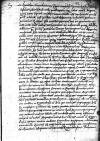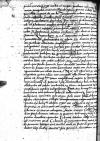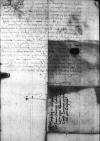Letter #563
Johann REYNECK to Ioannes DANTISCUSAugsburg, 1530-11-20
Manuscript sources:
Auxiliary sources:
| ||||||||
Text & apparatus & commentary Plain text Text & commentary Text & apparatus
Reverendisimo amplissimoque in Christo Patri et Domino, domino
Salutem et humilem commendationem.
Reverendissime amplissime Praesul, domine benignissime.
Accidit id mihi, quod mutis atque adeo nodis paper damaged⌈[is]is paper damaged⌉ linguae omni aetate ligatis accidisse meminimus, ut necessitate quadam praesenti adducti vel praesentem vim deprecati, infantiam prorsus posuerint. Quippe cum natura prorsus me sic genuerit et vitae meae usus ad hoc confirmarit, ut adversa quaeque libentius tolerare, quam queri, potuerim, tamen hoc tempore ita vincenda necessitate fuit natura, usus vitae commutandus, ut et simul mala mea me queri oporteat tolerare aequo animo, et apud Benignitatem Tuam levamen quoque rogare sit necesse.
Quorum meorum malorum causa cum a magnis istis divis,
Equidem, cum
Quid facerem? Purgandi mei animus ardens solum, non ambitio gratiae irati numinis induxit ad reditum Augustensem me. Huc ubi est ventum, cum  AAWO, AB, D. 67, f. 42v primum me
AAWO, AB, D. 67, f. 42v primum me
Deinde agitur per me sedulo non pro ullis magnis in me beneficiis conferendis, solum restituendo facto impendio. Tandem post quartum mensem proponuntur indignae condiciones famulitii per regem
Urget me hospes pro residuo impendii et victus. Comitia sunt exacta, loculi exhausti. Frustratur me
Nec est apud me ex istis angustiis exitus alius, nec concepta ulla bona spes alia, quam ut Benignitatem Tuam Amplissimam rogem, si quo pacto, si suis incommodis id poterit, ut commiseratione tam inclementis, illiberalis non solum tractationis, sed etiam inhumanae et istis amplissimis regibus indignissimae, Reverendissima Tua Benignitas, sive illa hidden by binding⌈[a]a hidden by binding⌉ humanitas sua inducere potest, sive utriusque patriae nostrae hidden by binding⌈[rae]rae hidden by binding⌉ arctissima amicitia, sive etiam fidei meae, quam tibi sanctissime obstringam, religio, commiseratione erga me ducaris hidden by binding⌈[is]is hidden by binding⌉ gratia et benignitate aliqua erga me afficiaris et ex istis angustiis et curis meis me eripias.
Potero ab hospite meo hidden by binding⌈[eo]eo hidden by binding⌉ liberare et iter in  AAWO, AB, D. 67, f. 43r fide me erga Amplitudinem Tuam geram.
AAWO, AB, D. 67, f. 43r fide me erga Amplitudinem Tuam geram.
Quantoque haec nec paper damaged⌈[c]c paper damaged⌉essitas atque pecuniae indigentia est maior atque acerbior, [...] paper damaged⌈[...][...] paper damaged⌉a, Reverendissime ms. ae(!) ⌈ee ms. ae(!) ⌉ Domine, tanti beneficii magnitudo maiori me gratitudine me obstringit et perpetuo liberationis meae written over meam⌈meammeaemeae written over meam⌉ benignitatem written over ...⌈... illegible⌈...... illegible⌉emem written over ...⌉ et superinscribed⌈etet superinscribed⌉ gratiae tuae acceptam habebit.
Agnoscet vel hoc iniquissimo tempore conscientia mea uni tibi deberi vitita vitatam turpis discessus ignominiam et existimatio tua mea hactenus illesa gaudebit tua benignitate contigisse, quod a sua laude non deciderit. Impudens factu videri potest, quod non satis notus a te auxilia petam, sed impudens non est, si impudentia caret solaee written over a⌈aae ms. e(!)
⌈aeae ms. e(!)
⌉aee written over a⌉ humanitatis ductae et laude potius sit dignum ignotum tuis beneficiis servatum esse, sed tum gratum numquamque immemorem. Obstringo gratiae tuae fortunas meas omnes, fidem, quod unum(?) bonorum virorum vinculum est praeciosius, me quoque ipsum corpore in tuam do potestatem.
Commendo me Reverendissmae ... illegible⌈...... illegible⌉ Gratiae Tuae, ne me pro tua benignitate egentem destitutumque omnibus auxilis deseras.
Vale.
Reverendissimae Gratiae Tuae mancipium



